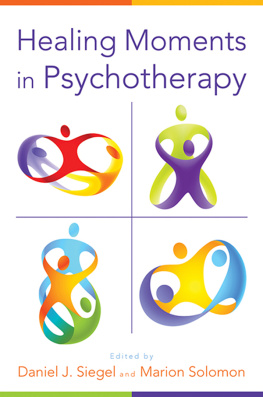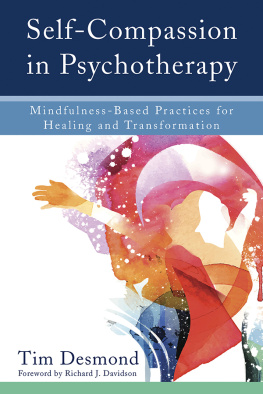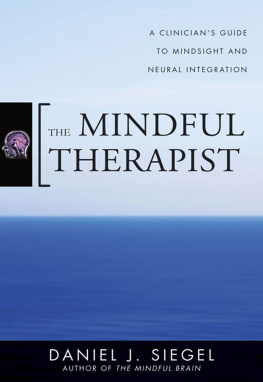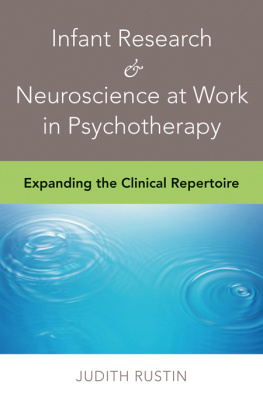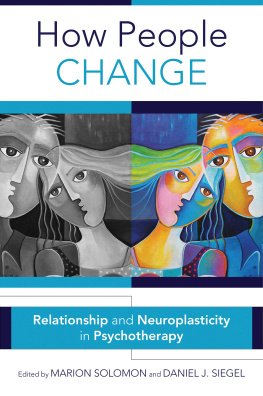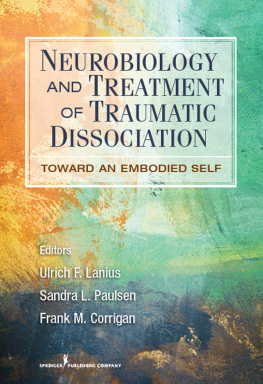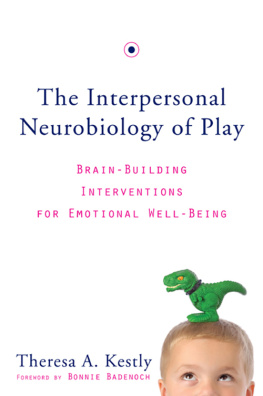
Healing Moments
in Psychotherapy
Edited by
DANIEL J. SIEGEL
and
MARION SOLOMON

W. W. Norton & Company
New York London
Allan N. Schore, PhD, Series Editor
Daniel J. Siegel, MD, Founding Editor
The field of mental health is in a tremendously exciting period of growth and conceptual reorganization. Independent findings from a variety of scientific endeavors are converging in an interdisciplinary view of the mind and mental well-being. An interpersonal neurobiology of human development enables us to understand that the structure and function of the mind and brain are shaped by experiences, especially those involving emotional relationships.
The Norton Series on Interpersonal Neurobiology will provide cutting-edge, multidisciplinary views that further our understanding of the complex neurobiology of the human mind. By drawing on a wide range of traditionally independent fields of researchsuch as neurobiology, genetics, memory, attachment, complex systems, anthropology, and evolutionary psychologythese texts will offer mental health professionals a review and synthesis of scientific findings often inaccessible to clinicians. These books aim to advance our understanding of human experience by finding the unity of knowledge, or consilience, that emerges with the translation of findings from numerous domains of study into a common language and conceptual framework. The series will integrate the best of modern science with the healing art of psychotherapy.
A Norton Professional Book
Copyright 2013 by Mind Your Brain, Inc., and Marion Solomon
1:Introduction: Interpersonal Neurobiology and Psychotherapy Copyright 2013 by Marion Solomon and Mind Your Brain, Inc.
2:Intersubjective Mindfulness: Facilitating Mindfulness in the Abused or Neglected Child Through the Mindfulness of the Therapist and Parent Copyright 2013 by Daniel A. Hughes
3:Technique and Beyond: Therapeutic Enactments, Mindfulness, and the Role of the Body Copyright 2013 by Pat Ogden
4:A Window into the Brain of Complex PTSD: Clinical and Neurobiological Perspectives Copyright 2013 by Ruth A. Lanius, Robyn Bluhm, and Paul A. Frewen
5:Hemisphere Differences and Their Relevance to Psychotherapy Copyright 2013 by Iain McGilchrist
6:Redefining Trauma and Its Hidden Connections: Identifying and Reprocessing the Experiential Contributors to a Wide Variety of Disorders Copyright 2013 by Francine Shapiro
7:Healing Trauma and Creating Secure Attachments Through EMDR Copyright 2013 by Debra Wesselmann
8: Turbocharging the Affects of Innate Healing and Redressing the Evolutionary Tilt Copyright 2013 by Diana Fosha
9:Affective Neuroscience: Implications for Understanding Emotional Feelings and Development of New Therapeutics Copyright 2013 by Jaak Panksepp
10:Helping Intimate Partners to Heal Each Other Copyright 2013 by Marion Solomon
11:The Mindful Group: Using MindBodyBrain Interactions in Group Therapy to Foster Resilience and Integration Copyright 2013 by Bonnie Mark-Goldstein and Mind Your Brain, Inc.
12:Therapeutic Presence: Mindful Awareness and the Person of the Therapist Copyright 2013 by Bonnie Mark-Goldstein and Mind Your Brain, Inc.
All rights reserved
Printed in the United States of America
First Edition
For information about permission to reproduce selections from this book, write to Permissions, W. W. Norton & Company, Inc., 500 Fifth Avenue, New York, NY 10110
For information about special discounts for bulk purchases, please contact W. W. Norton Special Sales at specialsales@wwnorton.com or 800-233-4830
Manufacturing by Quad Graphics, Fairfield
Production manager: Leeann Graham
Library of Congress Cataloging-in-Publication Data
Healing moments in psychotherapy / edited by Daniel J. Siegel and Marion Solomon.
pages cm. (The Norton series on interpersonal neurobiology)
Includes bibliographical references and index.
ISBN 978-0-393-70762-5 (hardcover)
ISBN 978-0-393-70883-7 (e-book)
1. Psychotherapist and patient. 2. Communication in psychiatry. I. Siegel, Daniel J., editor of compilation. II. Solomon, Marion Fried, editor of compilation.
RC480.8.H42 2013
616.8914dc23
2013018933
W. W. Norton & Company, Inc., 500 Fifth Avenue, New York, N.Y. 10110
www.wwnorton.com
W. W. Norton & Company Ltd., Castle House, 75/76 Wells Street, London W1T 3QT
To Matthew,
whose love gives meaning to earned secure attachment
M. F. S.
To Caroline,
my in-house healer
D. J. S.
Contents
HEALING MOMENTS IN PSYCHOTHERAPY offers you an opportunity to dive deeply into the art and science of healing from the perspective of a variety of clinical approaches and scientific viewpoints. As a compilation of a dozen clinicians and scientists combined experience and wisdom, this book can serve as a window into the process of healing that we hope will provide both practical examples and empowering research data supporting the ways therapeutic relationships help catalyze healing within psychotherapy.
In this brief introduction we concisely summarize the approach of each of the books chapters and weave these together with the conceptual framework of the consilient field of interpersonal neurobiology. By combining a range of ways of knowing into one view of the nature of being humana view of the human mind, development, relationships, the brain, and well-beinginterpersonal neurobiology (IPNB) offers a home for a variety of fields such as education, parenting, contemplation, organizational functioning, and, naturally, psychotherapy. Within Nortons Interpersonal Neurobiology Series, of which this book is a part, we have three dozen professional texts that provide practical applications of science for the psychotherapist. This book was inspired by the presentations of many authors in the series and other participants at the annual Lifespan Learning/UCLA IPNB conference held on campus in the spring. At those gatherings, clinicians and scientists offer cutting-edge views of how psychotherapy may work, and how clinicians can use this often new knowledge to improve their therapeutic skills.
One of the fundamental principles of IPNB is that the mind is a self-organizing, emergent process that is both embodied and relational and that regulates, as well as arises from, the flow of energy and information within us and between us. From an IPNB perspective, healing is the process of integration in which energy and information flow is cultivated, such that separate elements of a system are differentiated and then can become linked. Integration is the linkage of differentiated elements and allows the coordination and balance of a system to achieve harmony. When out of integration, we become out of harmony, and chaos and rigidity may ensue.
Trauma in the form of abuse and neglect, as well as inborn (i.e., nonexperientially derived) impediments to mental health, results from impaired integration. In fact, as a whole, the Diagnostic and Statistical Manual of Mental Disorders4th EditionText Revised (DSM-IV-TR; American Psychiatric Association, 2000) can be seen as examples of life conditionshowever they are causedthat result from impaired internal or interpersonal integration. Chaos and rigidity are the symptoms of the various syndromes listed in this clinicians manual; impaired integration, IPNB proposes, is the root of the mental dysfunction. Notice here that we are seeing a spectrum of causationfrom experiential to inbornthat may present as both chaos and rigidity that result from impediments to integration.
Next page
